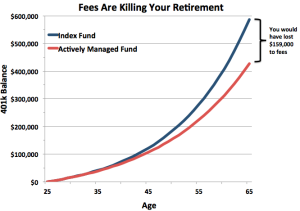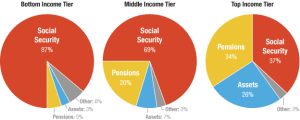 So How Much Do You Need to Retire? When it comes to financing their retirement, confusion reigns among Canadians and Americans. Some think the magic number is at least $550,000, while others believe they must save at least $1 million. They feel they need this amount to meet their lifestyle and to last for the time they will live during retirement. Many realize that they need more savings. They will need to continue working after the normal retirement age of 65.
So How Much Do You Need to Retire? When it comes to financing their retirement, confusion reigns among Canadians and Americans. Some think the magic number is at least $550,000, while others believe they must save at least $1 million. They feel they need this amount to meet their lifestyle and to last for the time they will live during retirement. Many realize that they need more savings. They will need to continue working after the normal retirement age of 65.
There are many other issues to the uncertainty, including the myriad of retirement savings theories, assumptions, and rules of thumb. For example,
- how much money you need to save,
- the rate of returns,
- how long you will live,
- what nursing homes cost,
- whether you want to give money to your kids and
- when you should do that.
In this post, we will focus on retirement and living comfortably, not bequeathing something to the family.
How Much Do You Need to Retire
Determining how much money you will need to save for retirement is unique for each individual. It is often more complex than using a simple theory. There is no one-size-fits-all solution. Common retirement savings theories should be carefully reviewed before being adopted. We will discuss a number of areas, and we urge readers to draw their own conclusions. They should make their personalized decisions based on their situation and their needs.
Government Pension Plans – CPP, OAS, Social Security
The belief that one’s retirement can be adequately funded through government payouts and public pension plans is a myth. Canada Pension Plan or US-sponsored Government plans will not provide enough. Indeed, these payments will certainly help with your retirement. They will not substantially replace your income unless you are already on the poverty line. For example, in Canada, if you were making $50,000 a year, you can expect around $17,000 from the CPP and OAS per year. This is roughly about 35% of your current income. This is a massive drop in income if you have no other income to rely on.
Company-Sponsored Pension Plans
If you are lucky enough to have a company-sponsored pension plan, you are well ahead of most consumers who do not. Employees are encouraged to request an estimate of their pension plans when they retire if they maintain current contributions. There are many different types of plans, so it is important to review the details. Speak with the benefits group to understand what your payments will be. The most common are “defined benefit plans” and “defined contribution plans.”
Do You Need All of Your Income in Retirement
The theory that one needs 70 percent to 80 percent of their pre-retirement income is just that—a theory. It is a good starting number to aim for since many of your expenses will be lower during retirement. For example, you will no longer need to contribute to unemployment and pension plans, which can cause a significant drop in requirements. Also, you are no longer going to work, so any expenses associated with travel to work are also not required.
However, you have to do something, and many people like to travel and pursue some of the activities you never had time to do while working. The best approach is to make a list and a budget of ongoing expenses and outline what you want to do during retirement. Whether hiking or cruising, you will need money to do these things. You will soon know whether you have enough money or not.
Is $1 Million Enough
The “magic” 1 million dollar assumption is just an assumption. It depends on your lifestyle and when you plan to retire. Someone who retires at 65 and does not plan any major travel or expensive projects may find that $1 million is more than enough. While retiring at 55 and planning major trips every year, they may find that they will need more funds. Again, prepare a budget and plan out your expenses vs. your income. For example, you can withdraw $50,000 20 to 22 times, depending on interest rates, before the $1 million is gone.
Five Percent Withdrawal Plans
Using four percent to five percent of accumulated savings annually during retirement is a pretty common approach. If your investments earn more than 5%, they will likely last during your retirement. If they earn less than 5%, they will decrease each year, and you may run out. Focus on good-quality income-earning investments to avoid running out of funds.
Delayed Retirement
Planning to delay retirement and continue contributing to your savings plans is always a good idea in order to afford retirement. Even delaying retirement by two years can make a huge difference in your assets and help ensure that your investments last longer.
So, How Much is Enough?
There are many considerations when it comes to planning one’s retirement, and consumers are urged to develop different scenarios and evaluate how much money they will have for retirement. The variables you should consider include the following:
- The age at which you wish to retire
- Pension plan income you will receive at retirement
- The type of lifestyle you want to lead
- Your health
- Whether you have outstanding debts going into retirement
- Your expected retirement expenses include housing, food, etc.
- Your current savings in registered and nonregistered accounts
It is important to know your retirement goals and objectives, identify your sources of retirement income, and start planning as early as possible. Review your plan at least once per year and more often if you have a major change in your life. These changes can include – loss of job, death in the family, moving, and, of course, retirement.
You may find that your retirement goals and lifestyle choices change over time, and consequently, the amount of money you need will change.





